- Home
- Lou Cameron
Renegade 30 Page 5
Renegade 30 Read online
Page 5
There was usually a line of shabby cantinas facing a waterfront, but they didn’t see anything like that open or, in fact, anything like that at all. There was a ship’s chandler, a sail loft and a boarded-up barbershop facing them as they made it across the quay to the shade. Captain Gringo said, “This way,” and led Gaston to the first slot in the storefronts he spotted. Gaston said, “I wonder where that one who saw us thinks we are going.” So Captain Gringo stopped and eased back to the corner to have a peek around it, back the way they’d just come. The men off SS Trinidad weren’t looking his way. He said, “If they noticed at all, they may think we have to take a leak.” then he added, “Oh, shit! Look out there on the water, just ahead of the steamer’s bows!”
Gaston did. He saw the same little steam launch flying the same officiously large British flag from its stem as it chugged its way their way. So they agreed they’d better get away from the waterfront, poco tiempo, because more than one jerk-off over that way knew they were ashore and which way they’d just gone!
*
It was Gaston who suggested a haunted house, or at least an empty house to haunt until the SS Trinidad was out of the harbor and their hair. Captain Gringo ^reed there had to be some empty buildings of some kind somewhere around here. Thanks to the raw materials boom of the 1880s, most tropic ports tended to be overbuilt. A lot of get-rich-quickers had gone broke in the worldwide financial panic of ’87, and a bankrupt banana or sugar firm could hardly take its warehouse with it as it went out of business. So as they moved inland along the tree-shaded red clay streets of Gilead, he started looking for places that looked deserted.
There was an embarrassment of riches. More than half the places they passed looked as if nobody had been home in some time. Such business structures as there might be in the little town were closer to the waterfront and the housing they were passing now looked residential. But where were the residents? As usual in an English-speaking colony, the little houses on either side had been built in the bungalow style the Brits had invented in India as a half-ass compromise between an Englishman’s Castle and a place more suited to the tropics. Little picket-fenced dooryards had been planted to look as much like English country gardens as one could manage with the lusher vegetation that grew down this way. Even a lime-juicer who dressed for dinner and insisted on roast beef with the temperature in the nineties knew that if you planted an apple tree south of the Tropic of Cancer, you got one hell of a big apple tree and no apples. So the lemon and mango in the yards made sense. But the way the weeds were growing behind the sun-bleached pickets didn’t. He said, “Jesus, I don’t think anyone’s mowed their lawn for at least a couple of months, anywhere on this block.”
Gaston said, “Oui, the colonial Englishman is a fiend for whitewash when he does not have to apply it himself, and regard how much wood is showing through along that veranda across the street. Shall we drop in and ask if the property is for rent? I do not think I wish to buy such a rundown property, hein?”
Captain Gringo hesitated, then said, “Right. If we’re wrong and there’s someone there, we can say … what? That we’re selling magazine subscriptions?”
“Let me do the talking. I shall ask directions in French. I have yet to meet a middle-class English housewife who speaks French.”
They had to go somewhere. So Captain Gringo opened the gate, noting how rusty its hinges were, and they waded through the waist high weeds to the front steps. As Gaston knocked on the peeling green paint of the front door, Captain Gringo moved to a dusty window, peered in and said, “Empty. Not even a stick of furniture inside.”
So Gaston took out his pocketknife to pick the lock but when he found the door unlocked, he simply opened it and they stepped inside.
The place smelled moldy. That was because it was. Unless one kept at it in the tropics, woodwork began to mold and rot in no time. Gaston said, “I wonder if they left anything to eat or, better yet, to drink.” But Captain Gringo told him to stay put as he moved to the nearest shadeless dusty window and peered out through the grime to see if anyone else in the neighborhood wanted to make anything out of their visit.
There didn’t seem to be anyone else in the neighborhood. Not even a tree leaf was stirring in the fetid afternoon air as he stared out at the blank-eyed houses all around. He said, “This is weird. Where do you suppose everyone went, Gaston?”
The Frenchman shrugged and asked, “Who cares? Perhaps there was a crop failure, a plague or some other such jolly occurrence, hein?”
“People don’t drop off cargo at a ghost town. Those natives taking delivery back there looked pretty solid, too. Let’s look around.”
They did, but the empty house had little to say to them. The people who’d once lived there had moved out neatly, not even leaving a mess behind them. So the evacuation had been planned and unhurried. The wallpaper was starting to peel in places and sprout moss in others, but there no sign of a fire, a struggle or any other sudden emergency. They’d just moved away, period.
There was no upstairs to explore. So Captain Gringo told Gaston, “We need a higher vantage point, and it doesn’t look like those are as hard to find in Gilead as I thought they might be. Let’s see if we can find a taller house to haunt. I’d like to know what that steamer’s doing about now.”
Gaston said he was sort of interested, too. So they went out the back door, crossed more weeds and worked their way along an alley that was starting to revert to jungle. Just for the hell of it, they tried a couple of other houses farther down the way. They were deserted, too. Captain Gringo muttered, “Shit, those guys who met the ship must live some damned where!” and Gaston said, “Oui, but most likely in the usual native quarter. You English do not like dusky neighbors. So, most naturally, natives who work for you live on the other side of les tracks, non?”
“Watch your mouth. I’m Connecticut Yankee, not English, and I doubt if there are any tracks running through this neck of the woods. Where the hell would a railroad run to?”
“Ah, oui, from time to time, when they are not having a civil war, the Nicaraguans do seem to think this neck of les woods is theirs. Never the less, we shall find a native quarter across some sort of established boundary line. Perhaps the drag or main? There were hardly enough business establishments near the waterfront for even a town of these modest proportions, hein?”
They came out of the alley. Across a green—now overgrown knee-deep in freshly self-sewn sea grape—stood the white frame church they’d noticed from the sea. Its whitewash was in bad shape, too, and a side door gaped open on its hinges. Captain Gringo grinned and said, “Perfect. We’ll have a bird’s eye view of the whole layout from up in the belfry.” He paid no attention when Gaston asked if he didn’t mean a bat’s eye view. The church did look a little spooky inside, although not so rundown and decayed as the other places they’d just explored. The church had probably stayed in business longer as the other colonists abandoned ship, for whatever reason. He led the way down a side aisle, found the door to the belfry—or at least a door leading to a ladder running straight up—and said, “This ought to be the way up into the steeple. Let’s go.”
Gaston followed, albeit bitching all the way. Captain Gringo shoved the trapdoor at the top of the ladder out of the way and helped Gaston up into the belfry. The bells were still there. So was a thick crunchy layer of moss-covered guano. He told Gaston, “When you’re right, you’re right. This is bat shit, sure as hell. Remember that cave in Mexico?”
“Only too vividly! Let us depart before we catch rabies! Regard that mass of brown fur above us, you triple-headed idiot!”
Captain Gringo glanced up, gulped and said, “Hell, they’re all asleep at this hour. They might not all be rabid, anyway.”
“Merde alors, one rabid bat will do it, and there must be more than a thousand hanging up there in the hollow of that steeple!”
Captain Gringo moved to the belfry shutters and peered out. He said, “Hot damn! I can see the steamer from here and, be
tter yet, they’re hauling in the gangplank!”
“I am still going to die of rabies, avec foaming at the mouth and biting you on your stubborn derriere! What of our jolly British harbor patrol?”
Captain Gringo didn’t see any kind of watercraft moving out on the flat, calm waters of Mission Bay, although it was hard to make out distant detail at this time of day. The overhead sun was steaming a shimmering haze off both the harbor and surrounding tropic vegetation. He could see down the bay as far as the river pretty well. The other township of Zion was a sort of wavering blur. He couldn’t tell if people or just the walls and rooftops were dancing in the sunlight like that. He turned around to rest his eyes in the bat-scented darkness of the belfry. He said, “I think we made it. We’ll know soon enough.” Then he hunkered down, took out a claro and lit up. Gaston, still on his feet, growled, “Merde alors, can’t we get out of this bird cage filled with bats, now?”
Captain Gringo said, “Sure we can. We just have to go back down the ladder and hope we don’t run into a shore party from the steamer. They know we came ashore. I don’t see how they could have seen us get back aboard, so …”
Gaston hunkered down beside him, cursing in a mixture of French and Arabic, and got his own smoke going. The silently smoked their cigars short. Then Captain Gringo rose for another peek and said, “Thar she goes. But how come no thar she blows?”
“Dick, are you saying anything at all or just making noises? I thought my English was formidable until I met you. Explain your latest words of wisdom in less cryptic fashion, hein?”
Captain Gringo said, “When a steamer leaves port, she’s supposed to sound off, even when she hasn’t left at least two passengers stranded. The skipper didn’t sound his siren coming in. He’s leaving just as sneaky. How do you figure it?”
“Sacre goddamn, do I look like a skipper of steamships? Perhaps his tooter is simply broken. He put in by broad daylight. We saw a British harbor patrol launch puffing over for a chat with him about his visit. Perhaps they did not wish to wake up these rabid bats above us. Who else was there to toot at?”
“Us. They knew we’d come ashore. They should have given us a warning blast on the siren before shoving off like that, damn it!”
Gaston laughed incredulously and said, “Merde alors, we go to so much trouble to desert the ship, and now you are angry because we got away with it?”
Captain Gringo chuckled sheepishly and said, “Yeah, we did, didn’t we? Let’s go back down and scout up some friendly natives. We’ll just hole up here until another vessel going our way puts in, and that’ll be that.”
The first native they met met them at the foot of the ladder and didn’t really look too native. She was about nineteen, obviously Anglo-Saxon and obviously confused as hell to see them coming out of the ladder door. Her voice was as peppery as her red hair when she asked, “Who are you two, and what have you been up to in our belfry?”
Captain Gringo smiled down at her and said, “We thought this place was deserted, Miss, ah …?”
“Perkins, Olivia Perkins, and I’m not a miss, I’m married to the Reverend Hiram Perkins; and you still haven’t told me who you are or why I just caught you creeping about our church when it’s not open for services!”
He introduced himself and Gaston, by the same phony names, as he regarded her trim figure wistfully. She was dressed in a modest enough Gibson girl blouse and skirt, but old Gibson knew what he was doing when he put his yummies in that up-to-date summer outfit. There was no point in staring, though, if she was married. So to soothe her he explained, “We seem to have missed our ship. We climbed up in the belfry just now to see if we could spot it.”
“And did you?”
“I’m afraid so. Putting out to sea. I guess we’re beached here until the next coastal vessel puts in. Would you have any notion when that might be, ma’am?”
She frowned thoughtfully. She was pretty, no matter what she did with her soft but fine-boned features. She said, “Oh dear, you gentlemen may be beached indeed! Didn’t anyone tell you this colony has been abandoned by the Crown?”
“You and your husband still seem to be here, ma’am.”
An odd look flickered across her face. Then she lowered her emerald green eyes and murmured, “So we are. You’d better talk to Hiram about it. He understands the situation better than I do. Or at least he says he does.”
She turned away to lead them the length of the church, out the same side door and around to the rectory behind the larger building. The private quarters of the minister and his young wife were built in the same style. The rectory could have used a coat of whitewash, too, and the yard was going to reach up and strangle them all in their sleep if someone didn’t get at it was a grass whip pretty soon. But it wouldn’t have been polite to tell a lady she was a sloppy housekeeper; and as she led them in via the back door, they could see that the interior of the house, at least, was still in order.
Olivia sat them at her kitchen table and placed some tea and biscuits on it between them before going to fetch her husband. The tea was cold. The biscuits were stale. But it didn’t take long for the redhead to return with a man old enough to be her father and then some. She introduced him as her husband, the Reverend Hiram Perkins. He creaked himself down to a seat at the head of the table, and when his wife poured tea for him, he said, gently but firmly, “Olivia, Dear, this tea has gone cold and flat.”
She shrugged and said, “Don’t drink it then. I’ve used all the firewood those lazy niggers left out back before they ran away to the jungle to eat people, damn it!”
“Olivia, Dear Heart, in front of guests?”
The redhead started to say something, flounced her head and stormed out of the room instead, leaving all three men staring at one another awkwardly.
Perkins sighed and said, “You must forgive her, gentlemen. She’s rather upset at Her Majesty these days, and I fear she tends to lash out at those closer to her.”
Captain Gringo nodded soberly and said, “We couldn’t help noticing this town was sort of, ah, spooky, sir. What’s going on here in Gilead?”
Perkins tried another sip of Olivia’s awful tea, put his cup back down with a grimace of distaste and said, “Hardly anything at all, at the moment. As you see, only a few are left here. I don’t know what’s gotten into Whitehall, but they seem to have decided to return this colony to Nicaragua. Can’t imagine what the perishing Nicaraguans want with it. No Nicaraguans living within fifty miles. But there you have it.”
From the doorway, his wife spat, “It’s all the work of that bloody Yank, Grover Cleveland! Who is the bloody President of the bloody States to tell freeborn English where they might or might not have a colony? Did Victoria Regina sign any bloody Monroe Doctrine? She did bloody not! Did even the perishing Nicaraguans sign the bloody Monroe Doctrine? Coo, the flaming dagos couldn’t even read the bloody thing!”
Her husband sounded something like a bleating sheep as he begged her, “Olivia, please! Your language, Dear Heart!”
“Oh, bloody, bloody, bloody!” she replied, and then flounced out again. Some dames were like that when they didn’t know just where they wanted to be. Old Hiram was doubtless trying to cover for her as he said, “She has a point, you know. It seems our Foreign Office has the wind up since that Venezuelan crisis a few months ago. You two must have heard about that of course?”
“Yeah, just a little,” said a smiling Captain Gringo, who along with Gaston had actually taken part in a showdown that had almost led to a real no-kidding war between Great Britain and the United States.
The minister said, “I couldn’t understand it at all myself. Until this Cleveland chap got himself elected, nobody though the so-called Monroe Doctrine applied to us! But with a maniac in Washington who really seems to mean what he says, London seems to want to smooth things over by playing up to the blighter for now. So, since this colony was acquired in a rather, ah, informal manner while the Dons were at one of their seasonal revolutions a few y
ears ago—”
His wife cut in from the doorway again with, “Coo, are we giving back British Honduras with its mahogany? We are not! Are we letting those bloody bandito bastards have Bluefields with its pearl beds and sponge-flats back? Not bloody likely! They’ve sold us out because there’s nothing here but souls to save, and the bloody bastards in Whitehall wouldn’t know a soul if they woke in bed with one, for not one of them ever had a soul, the bloody sods!”
Then she lit out again. Captain Gringo couldn’t help wondering where she went when she wasn’t cussing from the doorway. As if he hadn’t noticed, he told her husband, “Well, whatever the reason, all the deserted dwellings we just passed are starting to make sense. But the ship we came in on just dropped off a lot of stuff, sir. So there must be some people left here now, right?”
Before Perkins could answer, Olivia shouted in at them, “Coo, there’s nobody left on this side of the river but the bloody dagos, and half of them’s run away! What are we staying here for, husband? All the whites are across the river in Zion, and who knows how long they’ll be there? The flaming game is up! They’ve sold us out to the bloody Nicks! Can’t you see that?”
He must have heard, from the way he grimaced. But he answered Captain Gringo instead, sort of, by saying or asking, “What else can we do? My church back home sent me here on a mission to the Indians, and they’ll still need me, no matter whose flag flies over Gilead in the future.”
“What flaming Indians?” his young wife demanded from the doorway, adding; “They’ve all run away. You could never get the perishing barefoot beggars to sit through a sermon even when they were here!”

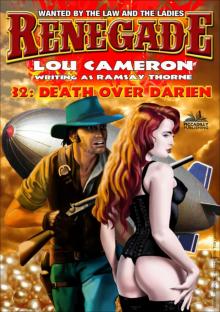 Renegade 32
Renegade 32 Renegade 31
Renegade 31 Piccadilly Doubles 2
Piccadilly Doubles 2 Renegade 35
Renegade 35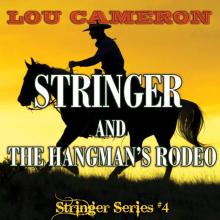 Stringer and the Hangman's Rodeo
Stringer and the Hangman's Rodeo Renegade 28
Renegade 28 Renegade 23
Renegade 23 On Dead Man's Range
On Dead Man's Range Citadel of Death (A Captain Gringo Western Book 11)
Citadel of Death (A Captain Gringo Western Book 11)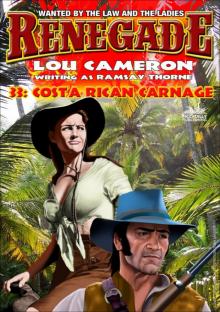 Renegade 33
Renegade 33 Over the Andes to Hell (A Captain Gringo Western Book 8)
Over the Andes to Hell (A Captain Gringo Western Book 8)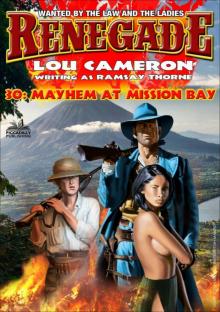 Renegade 30
Renegade 30 Renegade 36
Renegade 36 Stringer in a Texas Shoot-Out
Stringer in a Texas Shoot-Out The Death Hunter
The Death Hunter Stringer and the Wild Bunch
Stringer and the Wild Bunch Renegade 29
Renegade 29 Renegade 21
Renegade 21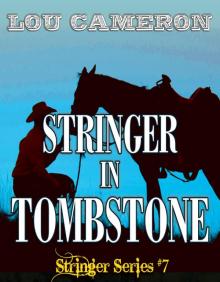 Stringer in Tombstone
Stringer in Tombstone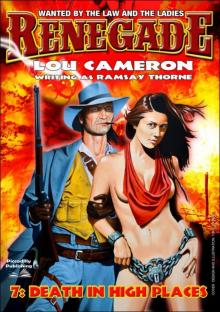 Death in High Places (A Renegade Western Book 7)
Death in High Places (A Renegade Western Book 7)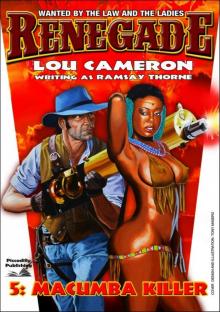 Macumba Killer
Macumba Killer Renegade 17
Renegade 17 Stringer on the Mojave
Stringer on the Mojave Blood Runner
Blood Runner Renegade 22
Renegade 22 Stringer and the Hanging Judge
Stringer and the Hanging Judge Stringer and the Hell-Bound Herd
Stringer and the Hell-Bound Herd File on a Missing Redhead
File on a Missing Redhead Stringer on the Assassins' Trail
Stringer on the Assassins' Trail Mexican Marauder (A Captain Gringo Adventure #16)
Mexican Marauder (A Captain Gringo Adventure #16) Stringer
Stringer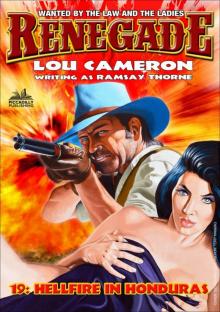 Renegade 19
Renegade 19 Stringer and the Oil Well Indians
Stringer and the Oil Well Indians Stringer and the Lost Tribe
Stringer and the Lost Tribe Piccadilly Doubles 1
Piccadilly Doubles 1 Stringer and the Border War
Stringer and the Border War Renegade
Renegade The Badlands Brigade (A Captain Gringo Adventure Book 12)
The Badlands Brigade (A Captain Gringo Adventure Book 12) Stringer and the Deadly Flood
Stringer and the Deadly Flood Renegade 25
Renegade 25 The Great Game (A Captain Gringo Western Book 10)
The Great Game (A Captain Gringo Western Book 10) Stringer on Pikes Peak
Stringer on Pikes Peak